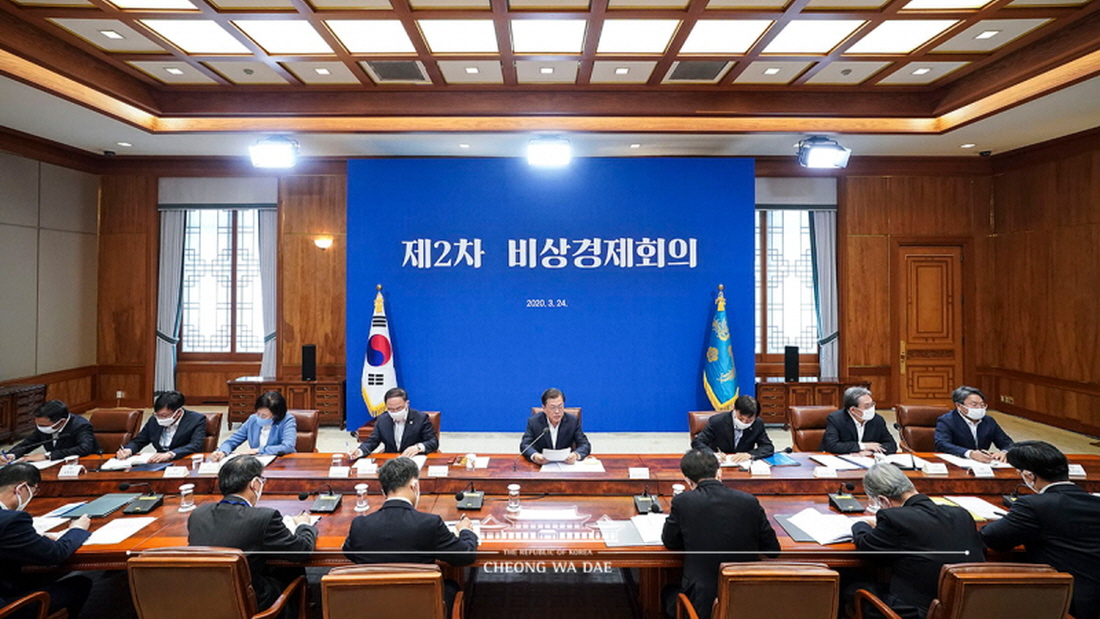이 웹사이트는 제19대 대통령 임기 종료에 따라 대통령기록관이 「대통령기록물 관리에 관한 법률」에 의해 이관받아 서비스하는 대통령기록물입니다. 자료의 열람만 가능하며 수정 · 추가 · 삭제는 불가능합니다.
다만, 「개인정보보호법」에 의하여 개인의 정보를 보호받기 원하시는 분은 관련 내용(요청자, 요청내용, 연락처, 글위치)을 대통령 웹기록물 담당자(044-211-2253)에게 요청해 주시면 신속히 검토하여 조치해 드리겠습니다. 감사합니다.
SPEECHES & REMARKS
BRIEFINGS
Opening Remarks by President Moon Jae-in at 2nd Emergency Economic Council Meeting

Let me begin the 2nd Emergency Economic Council meeting.
The global economy is in a crisis, and gauging when it will end is difficult. Our economy is taking an enormous hit because we are so heavily dependent on foreign markets. Our businesses are especially in immense trouble, and they, as the main players in production and investment, represent the very foundation of our economy. No one is exempt. Self-employed business owners, small and medium-sized businesses, and the major corporations in Korea’s flagship industries are all affected. The collapse of the global supply chain is disrupting production and exports, which is eroding business performance and causing corporate credit ratings to plunge. These developments could trigger a liquidity crisis for businesses. Thus, countermeasures are urgently needed.
The 2nd Emergency Economic Council meeting today starts with the Government’s resolute determination to protect Korean businesses by all available means. The Government will serve as a stalwart seawall that stems the tidal wave of crisis descending upon our businesses.
We will unfailingly prevent the impact of the COVID-19 outbreak from driving businesses into bankruptcy. Healthy and competitive businesses will never be allowed to become insolvent because of a temporary liquidity shortage. We will provide proactive support to those businesses that have the capability to prevail in these hard times so long as they have access to financing.
To this end, we have determined to inject an emergency relief fund valued at 100 trillion won, double the original 50-trillion-won special emergency financial measure decided on during the 1st Emergency Economic Council meeting. The injection of this emergency relief fund is designed to offer fail-safe support to not only microbusiness owners and SMEs but even the leading players in the mainstay industries, covering both the blue-chip companies and the less profitable ones. This is an extraordinary, preemptive measure to safeguard our businesses and, at the same time, a mission to preserve people’s jobs by rescuing businesses.
As an addition to the 22.5 trillion won in financial support announced last time for SMEs, microbusiness owners and the self-employed, the measure this time will provide large-scale financial assistance to support the operations of SMEs and mid-market companies; help stabilize the corporate bond market, where a credit crunch looms; and calm the volatile stock market.
First, we will provide an additional 29.1 trillion won in operating funds to SMEs and mid-market companies to address their overpowering financial straits. Loan guarantees will increase to 7.9 trillion won, and on top of that, state-owned financial institutions will provide 21.2 trillion won in loans. We will prevent businesses from collapsing due to a temporary lack of funds, including even large companies if necessary.
Next, we will raise a bond market stabilization fund worth 20 trillion won to resolve temporary financial difficulties that sound companies could face due to financial market instability. We will also help meet the demand for short-term funds by purchasing corporate bonds and bills. We’ve doubled the original 10 trillion won earmarked for this purpose.
In addition, we will provide 17.8 trillion won in separate funds to companies momentarily strapped for liquidity because of the COVID-19 outbreak. We will actively support corporate bond purchases through the primary collateralized bond obligations and the fast underwriting system for corporate bonds as well as provide sufficient liquidity to the call money market. A total of 11.1 trillion won will be added to the originally planned 6.7 trillion won to bolster our support.
We will also launch a stock market stabilization fund worth 10.7 trillion won. The amount has increased 20 times from 500 billion won created during the 2008 global financial crisis, and the participation of financial institutions has also expanded significantly. The fund will protect investors and serve as a safety valve for the stock market by investing in indexes instead of individual company shares. I extend my gratitude to the financial institutions for their active participation, and the Government will also work hard to resolve their difficulties.
At today’s meeting, we will also discuss separate employment support measures. When businesses undergo hardships, the employment situation can deteriorate rapidly. The reason the Government is taking quick action to assist businesses in response to their hardships is ultimately to stabilize employment. Distressed businesses in rapidly increasing numbers have recently been applying for subsidies in exchange for retaining employees. I ask you to vigorously review the ways to increase these subsidies tremendously.
Moreover, swift measures are needed to defer or exempt payment for the four major social insurance premiums and bills for electricity and other utilities. This will both support individuals’ livelihoods and lower businesses’ expenses, thereby helping to retain jobs.
I urge you to quickly conclude these measures at today’s meeting so that they can be of assistance to both the businesses and the people undergoing hardships generally. I also ask you to make sure that they will be put into force right away, from April 1.
I call upon you to get ready by considering the overall fiscal cost for effective measures to support livelihoods, so that we can quickly finalize our decisions at our upcoming third meeting. The biggest victims of the COVID-19 outbreak are the people. I ask you to quickly and clearly demonstrate the Government’s determination to protect their means to make a living.



